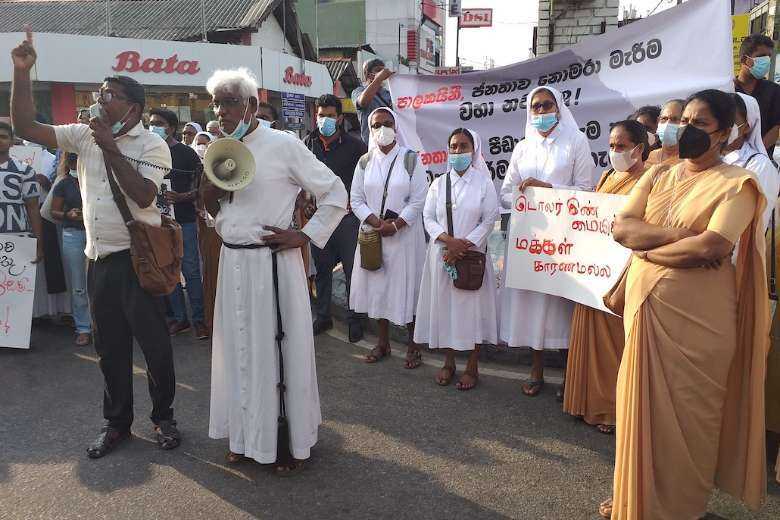Priests, nuns join public protests against Sri Lankan govt

Sri Lanka is in the grip of an unprecedented shortage of food, fuel and other essentials

Priests, nuns and laypeople march with banners and shout slogans in Negombo on April 2. (Photo: UCA News)
Published: April 04, 2022 08:12 AM GMT
Christian priests and nuns joined the public to protest the Sri Lankan government’s handling of the country’s economic crisis while suppressing public dissent.
Sister Rasika Pieris of Sisters of the Holy Family said nuns could not remain silent in convents as people suffer all over the country.
“People are in queues from morning till evening to buy essential items but they have only extreme uncertainty about their lives,” said Sister Pieris while addressing people in the center of Negombo during a protest on April 2.
Methodist and American missionary priests attended the Negombo protest, which was organized by the Christian Solidarity Movement. Thousands of people in the city supported the demonstration as protesters shouted slogans accusing politicians of keeping them hungry, taking commissions during the civil war, dividing people by race and religion, and robbing the central bank.
“The rulers should not deceive the people of the country anymore and there are plenty of examples in the world of governments being sent home by the strength of the people. We also tell the government to go home if the people can’t be saved from these disasters,” said Sister Pieris.
The nun said queues can be seen everywhere for food, medicine, domestic gas and fuel.
Civil society organizations and opposition political parties condemned the government for imposing a curfew and deploying security forces to prevent people from protesting
Father Sherard Jayawardana said the government is responsible for protecting people from all these crises.
“We chose the rulers to attack the Tamils and we were silent when the government attacked the Muslims — and the same thing happened to us Christians during the Easter Sunday attack,” said the priest.
“They deceived us and came to power by creating conflicts among religions and nations.”
Despite the government declaring a curfew from Saturday evening until Monday morning, hundreds of people flocked to public places to stage protests.
Hundreds of Sri Lankans in the USA, France, Finland, Canada, New Zealand, Germany, Italy and Hong Kong staged protests demanding the government resign over its failure to resolve multiple crises.
The government blocked access to social media including YouTube, WhatsApp, Messenger, Facebook, Viber and Twitter platforms for nearly 15 hours on April 3.
The European Union has expressed concern over the state of emergency declared by President Gotabaya Rajapaksa.
“People are in queues and unable to obtain essential goods and services. The Church stands with those who are suffering”
The government has announced that the state of emergency and the curfew were imposed with the sole purpose of safeguarding peace, public life and private property.
Civil society organizations and opposition political parties condemned the government for imposing a curfew and deploying security forces to prevent people from protesting.
The Human Rights Commission of Sri Lanka has questioned the declaration of a countrywide state of emergency in response to a planned protest campaign against the failure on the part of the government to address the continuing shortage.
Cardinal Malcolm Ranjith of Colombo has called for a change in the political system.
“People are in queues and unable to obtain essential goods and services. The Church stands with those who are suffering,” he said on April 2.
“Relatives of politicians who hold high positions in state institutions should be removed immediately and should be reformed with the advice of experts.”
“The president invites all political parties in parliament to accept cabinet posts and join the effort to seek solutions to the national crisis”
President Rajapaksa today offered to share power with the opposition as protests escalated across the country demanding his resignation.
His appeal to legislators came as heavily armed security forces looked to quell more demonstrations over what the government itself has acknowledged as the worst shortages of essentials since independence from Britain in 1948.
“The president invites all political parties in parliament to accept cabinet posts and join the effort to seek solutions to the national crisis,” Rajapaksa’s office said in a statement.
It stressed that solutions to the deepening crisis should be found “within a democratic framework” as hundreds were joining spontaneous demonstrations in cities, towns and villages.
The invitation came after 26 cabinet ministers — every member except Rajapaksa and his elder brother Prime Minister Mahinda Rajapaksa — submitted letters of resignation at a late-night meeting on Sunday. The country’s central bank governor Ajith Cabraal today joined the long list of resignations.
Trading was halted on the country’s stock exchange seconds after it opened as shares fell by more than the 5 percent threshold needed to trigger an automatic stop.
The government has announced it will seek a bailout from the International Monetary Fund, but talks are yet to begin.
Many economists say Sri Lanka’s crisis has been exacerbated by government mismanagement, years of accumulated borrowing and ill-advised tax cuts.




